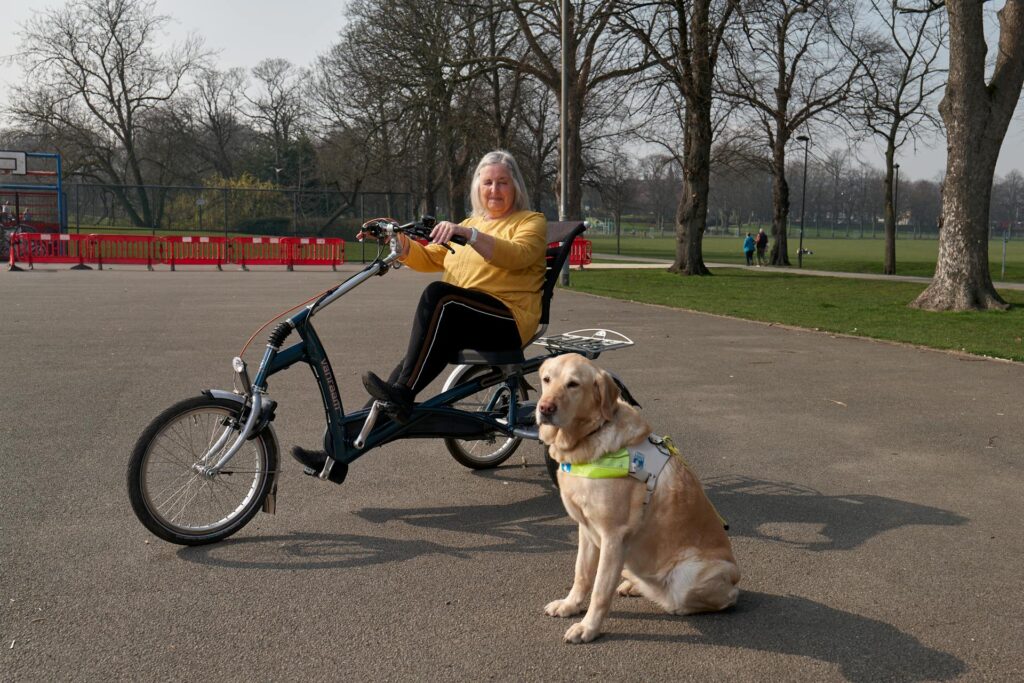For many people with disabilities, a trained service animal is essential for independence and safety. Yet across Illinois, individuals who rely on service animals are still wrongly denied access, questioned improperly, or treated with hostility. These experiences are not only humiliating—they may be violations of federal and state law.
1. You and Your Service Animal Must Be Allowed Into Almost All Public Places
Under the Americans with Disabilities Act (ADA), service animals must be allowed in any ‘place of public accommodation,’ including stores, restaurants, gyms, schools, hotels, government buildings, and public transit. See: 42 U.S.C. § 12182(a); 28 C.F.R. § 36.302(c).
Illinois adds protection through the Illinois Human Rights Act (IHRA), prohibiting denial of ‘full and equal enjoyment’ because of disability. See: 775 ILCS 5/5‑102(A).
Illinois also criminalizes denying entry to public places to someone with a service animal. See: 720 ILCS 5/48‑8.
2. What Questions a Business May Ask (Federal Rule)
Only federal law, and not Illinois, defines permissible questions. When it is not obvious the dog is a service animal, staff may ask only:
- ‘Is the animal required because of a disability?’
- ‘What work or task has the animal been trained to perform?’
See: 28 C.F.R. § 36.302(c)(6).
Illinois statutes do not list questions, but the Illinois Attorney General’s Service Animal Guidance aligns with these federal restrictions.
3. You Cannot Be Charged Extra or Treated Differently
Under the ADA, businesses cannot impose pet fees, segregate you, or provide different services because of your service animal. See: 42 U.S.C. § 12182(b)(1)(A)(ii); 28 C.F.R. § 36.302(c)(1).
The Illinois Attorney General guidance confirms the same.
4. When a Business May Ask You to Remove the Animal (Narrow Exceptions)
A business may remove a service animal only if:
- The dog is out of control and the handler does not take effective action – 28 C.F.R. § 36.302(c)(2)(i)
- The dog is not housebroken – 28 C.F.R. § 36.302(c)(2)(ii)
- The dog poses a direct threat that cannot be mitigated – 28 C.F.R. § 36.208
Even if the animal is removed, you must still be permitted to stay and receive services. See: 28 C.F.R. § 36.302(c)(2).
5. How to Document a Violation
Documentation is essential. Helpful evidence includes:
- Time, date, and location
- Names of employees involved
- What questions were asked
- Photos or video
- Witness contact information
6. Damages Available
Individuals harmed by service‑animal discrimination may be entitled to damages under state and federal law, including:
- Emotional distress damages
- Economic damages (e.g., out‑of‑pocket losses)
- Injunctive relief (such as policy changes and staff training)
- Attorney’s fees
- Civil penalties in certain cases
- Punitive damages – available in some federal ADA Title II/III contexts and certain state‑law claims
Each claim is fact‑specific, but individuals denied access often qualify for compensatory relief under the Illinois Human Rights Act.
7. When to Call a Lawyer
Call an attorney immediately if:
- You were denied access
- A business demanded documentation related to your service animal
- You were humiliated or treated differently
- Your service animal was removed
Conclusion
Your service animal is vital to your safety and independence. Illinois and federal law protect your right to access public spaces. If your rights were violated, contact 1818 Litigation Attorneys.
1818 Attorneys assists clients with ADA and IHRA claims, demand letters, litigation, and enforcement actions.


